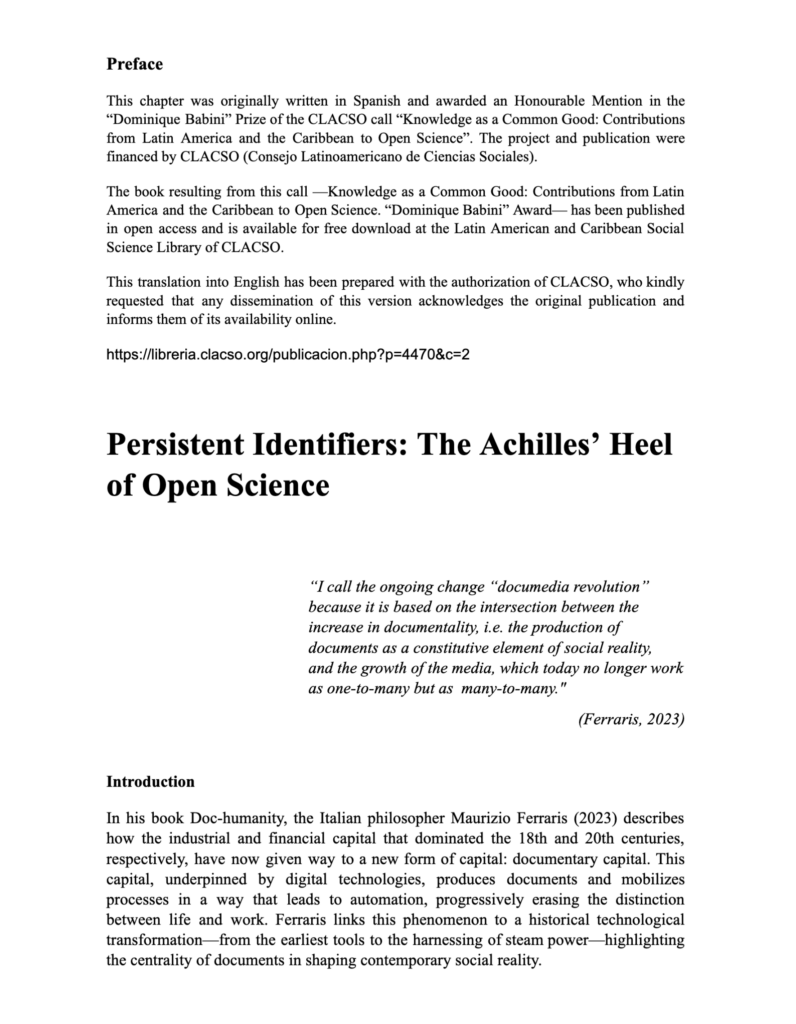A conversation with Sergio Santamarina
Sergio Santamarina works as a librarian in Argentina at the National University José Clemente Paz (UNPAZ) and has a focus on open science practices and challenges in Latin America. Together with Jo, he explores issues around open access publishing requirements, the cost barriers for obtaining Digital Object Identifiers (DOIs) in Latin American universities, and the importance of decentralized networks and persistent identifiers in research. The conversation concludes with an exchange of their views on the role of libraries in promoting open science, the need for diverse regional databases, and the importance of community-based approaches to knowledge sharing and infrastructure development.
Read the book chapter mentioned in this episode:

Latin America has long been a leader in open access, with initiatives like SciELO and Latindex setting global benchmarks for non-commercial scholarly publishing. However, the region faces significant hurdles, particularly in obtaining persistent identifiers like Digital Object Identifiers (DOIs). Sergio points out that the high costs associated with DOIs—around US$250 annually plus US$1 per article—are prohibitive for many institutions. This economic barrier often forces researchers to rely on European repositories, perpetuating a “colonial” dynamic in global knowledge sharing. To address this, Sergio advocates for regional DOI minting systems tailored to local economic realities, a sentiment echoed in broader discussions about the need for equitable open access models (Babini, 2015); (Chavarría, 2024).
The conversation further explores the importance of decentralized networks and alternative identifiers like Archival Resource Keys, aka ARKs. These systems could democratize access to research infrastructure, reducing dependency on centralized, often Western-dominated platforms. This aligns with the broader goal of decolonizing open science, empowering scholarly communities to develop their own resilient, community-based infrastructures (Reyes-Lillo, 2024); (Toro, 2024).
Libraries play a pivotal role in this ecosystem. Sergio emphasizes their function as community hubs that not only provide access to knowledge but also foster critical thinking and digital literacy. Initiatives like repurposing old computers with Linux-based solutions exemplify how libraries can bridge the digital divide, making technology accessible to first-generation university students. This approach aligns with the ethos of open science, which prioritizes inclusivity and the public good (Alperin, 2011); (Schallier, 2018).
The discussion concludes with a call to action for global collaboration, particularly between Latin America, Asia, and Africa. By sharing resources and expertise, these regions can strengthen their collective voice in the global open
science movement. Researchers, librarians, and policymakers are urged to engage in these efforts, fostering a more equitable and inclusive scientific landscape.
To support equitable Open Science initiatives and infrastructures, consider joining forums and working groups focused on decentralized identifiers and open access solutions to spread the message in your networks. Your participation can help shape a future where knowledge truly knows no boundaries and leaves no institution behind.
Schedule a call with Jo to explore tangible steps you can take at your institution.
- Babini, D, Machin-Mastromatteo, J D (2015). Latin American science is meant to be open access. Information Development, 31, 477 – 481. https://doi.org/10.1177/0266666915601420
- Chavarría, M et al. (2024). Why are Latin American countries in the limbo of open-access scientific publications? Science and Public Policy. https://doi.org/10.1093/scipol/scae073
- Reyes-Lillo, D, Pastor-Ramón, E (2024). Use of Handle in Institutional Repositories and Its Relationship with Alternative Metrics: A Case Study in Spanish-speaking America. Hipertext.net. https://doi.org/10.31009/hipertext.net.2024.i29.17
- Toro, R C et al. (2024). The needed link between open science and science diplomacy—A Latin American perspective. Frontiers in Research Metrics and Analytics, 9. https://doi.org/10.3389/frma.2024.1355393
- Alperin, J P et al. (2011). Scholarly Communication Strategies in Latin America’s Research- Intensive Universities. https://www.semanticscholar.org/paper/28ab3d83b2402e5c1713bf6bd68bfd4bf9aa81f4
- Costa, M, Leite, F (2016). Open access in the world and Latin America: A review since the Budapest Open Access Initiative. Transinformacao, 28, 1001. https://doi.org/10.1590/2318-08892016002800003
- Schallier, W (2018). From Open Access to Open Science: innovation in scholarly communication. IRIS – Revista de Informação, Memória e Tecnologia. https://doi.org/10.51359/2318-4183.2018.238909
